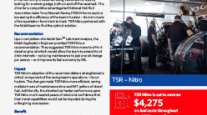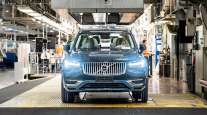Letters: D.C.’s Diesel Ban
These Letters to the Editor appear in the Dec. 23 & 30 print edition of Transport Topics. Click here to subscribe today.
Viewed from across the Atlantic, your news item headed “D.C. Mulls Ban on Diesel Vehicle Registrations” seems quite unbelievable.
Contrary to recent hopes and expectations expressed by passenger-car manufacturers such as Mercedes-Benz and Volkswagen/Audi, prejudice against diesel power in North America is clearly alive and well.
Lobbyists representing producers and marketers of alternative fuels, including natural gas and 100% biodiesel, are no doubt supporting the bill being considered by the Washington, D.C., Council.
Leaving aside the likelihood that Washington-based truck operators would, from 2018, seek ways of registering their diesel vehicles elsewhere, the bill illustrates the deep-seated antipathy to diesels held by those in public office in the United States and, by inference, voters on Main Street.
I understand that as recently as the 1980s, American parents could buy their sons, as a Christmas or birthday gift, a model truck that carried on the box the boastful rubric, “It smokes like a real diesel!” Back then, that novel feature had no negative connotations. But in the period since, growing environmental awareness and accompanying legislation have made visible emissions objectionable.
The fact that most heavy-duty American trucks, unlike their European counterparts, have chimney-like vertical exhaust stacks, has not helped matters.
It became fixed in the minds of American car buyers especially that diesel engines were polluting, smelly and noisy. Their superior fuel efficiency over their gasoline equivalents was of little consequence because all fuel was cheap, certainly by European standards. Today, with fuel costs taken more seriously, light-duty diesel power is nevertheless widely shunned, even by buyers of most SUVs and all but the heaviest-duty pickups.
When those city council members in Washington come to debate what many, including American Trucking Associations, rightly see as the preposterous diesel ban proposal, ahead of or after the public hearing Jan. 8, they should take note of the Environmental Protection Agency’s 2010 truck and bus emission limits, which are frequently trumpeted as “effectively zero.”
By 2018, when the mooted D.C. diesel ban would come into force, EPA-allowable pollutant levels will probably not have changed from those 2010 limits. However, federal legislation then will be focused on greenhouse-gas emissions, coupled with directly related fuel consumption standards, where diesel continues to reign supreme.
Lobbyists on both sides of the Washington diesel ban debate will be mounting campaigns. Mercedes, Volkswagen and others now marketing diesel cars in the United States could do worse than invite D.C. Council members to drive their latest offerings and perhaps even hold their white handkerchiefs against the vehicle tailpipes to check out the virtually nonexistent soot levels.
Council members blinkered for many decades against diesel’s virtues, through a perception of smoking truck exhausts, would probably be more receptive initially to a passenger-car demonstration, before then being made aware that current-generation diesel trucks are equally clean and green.
Alan Bunting
Writer
Freightway Press Service
Harpenden, Hertfordshire
England




